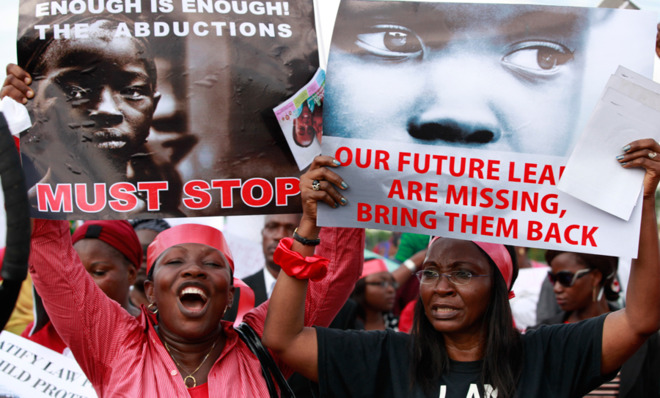Everything you need to know about the kidnapped Nigerian girls
Sadly, this is just one episode in a global epidemic. Right now, some 30 million people live in slavery.

It is potentially the largest human trafficking crime in recent history: Somewhere between 230 and 276 young women ages 16 to 18 are missing in northern Nigeria. They have been missing for nearly a month, since April 14.
Here, everything you need to know about this sickening tale:
Who took the girls?
The Week
Escape your echo chamber. Get the facts behind the news, plus analysis from multiple perspectives.

Sign up for The Week's Free Newsletters
From our morning news briefing to a weekly Good News Newsletter, get the best of The Week delivered directly to your inbox.
From our morning news briefing to a weekly Good News Newsletter, get the best of The Week delivered directly to your inbox.
The militant Islamist group Boko Haram claimed responsibility. The group operates in northeast Nigeria, Niger, and Cameroon. The group, whose name literally means "Western education is forbidden/sinful," and which came into existence in 2002, seeks to reconstitute Nigeria as a Muslim state under Sharia, and reverse what they see as trends toward "westernization."
Boko Haram has been particularly active in bombings of public spaces, including churches in northeast Nigeria, since 2011. In March 2012, they burned down 12 public schools. While they have attacked UN compounds in the past, they are very internally focused on Nigeria.
What will happen to these girls?
The BBC reports that most of have already been married off or sold to members of Boko Haram, and may further be sold to men in Chad and Cameroon. The leader of the group, Abubakar Shekau, did not confirm as much in a video obtained by AFP. Around 50 of the girls escaped, according to several reports, but the AP reports that 276 young women are still missing.
A free daily email with the biggest news stories of the day – and the best features from TheWeek.com
These girls also could potentially be shipped off to other continents. Dr. Lois Lee, the founder and president of the anti-child prostitution group Children of the Night, said that Europe tends to be a big hub for trafficked Nigerians.
How would they get into Europe?
Through Italy, Lee said. "Entering the U.S. from foreign countries, particularly Nigeria, is more difficult than the easy access to Europe through Rome — and more expensive as well."
"We do not see them in America," Lee said of trafficked African girls and women. "In Europe it appears that Nigerian women are a 'sexual delicacy' for European men — and they do not have to compete with the African American teens who are sex trafficked, many who are much younger."
Why is this happening?
Sadly, the exploitation of young girls is not exactly uncommon in Nigeria. According to Girls Not Brides, 39 percent of girls in Nigeria are married off before their 18th birthday. Sixteen percent are married before they turn 15. Only 23 of Nigeria's 36 states have adopted the 2003 UN Child Right's Act, which declares that anyone under the age of 18 is a child. One of the states that failed to ratify the Child Rights Act was Borno, where these girls were kidnapped.
Worse yet: Nigeria has one of the highest numbers of enslaved people in the world: between 670,000 and 740,000 people out of a total population of 168.8 million. For women and girls, and even boys, this often means sexual slavery.
Is this a problem only in Nigeria?
No. Globally there are an estimated 29.8 million people living in slavery. Carol Smolenski, the executive director of ECPAT USA (End Child Prostitution and Trafficking), said that this incident in Nigeria was an extreme and very dramatic example of trafficking — but that this sort of thing, on a smaller scale, happens every day, all around the world.
Even in the U.S., there are an estimated 57,000 to 63,000 enslaved people, according to the Global Slavery Index.
Of all countries, Mauritania has the highest percentage of its population enslaved. Between 140,000 and 160,000 people are enslaved in a country with a population of just 3.8 million, GSI says. India has the largest total number of people enslaved (between 13.3 million and 14.7 million), followed by China (2.8 million to 3.1 million), and Pakistan (2 million to 2.2 million).
"It's a trade in bodies," Smolenski said. "It's a commodity that has to be moved. Unlike other businesses it's disgusting and demeaning and horrifying, but like other business it's just moving your supply to market."
So what's being done about it?
Many of the anti-trafficking organizations that I contacted for this article said they were not commenting on this incident because of security concerns. Many regions of Nigeria are dangerous, and organizations operating in that country may be targeted if they are too outspoken.
Still, world leaders are beginning to take notice. On Tuesday the United Nations High Commissioner for Human Rights Navi Pillay said she had spoken with President Goodluck Jonathan and demanded that the girls be returned home. And the U.S. is sending law enforcement and military forces to Nigeria to help search for the missing girls.
Maya Shwayder is a graduate of Harvard and Columbia Journalism School whose work has appeared in The Atlantic, Gawker, Variety, The Forward, and DNAinfo. She is currently the U.N. and New York correspondent for the Jerusalem Post.
-
 In Okinawa, experience the more tranquil side of Japan
In Okinawa, experience the more tranquil side of JapanThe Week Recommends Find serenity on land and in the sea
-
 The Iberian Peninsula is rotating clockwise
The Iberian Peninsula is rotating clockwiseUnder the radar We won’t feel it in our lifetime
-
 San Francisco tackles affordability problems with free child care
San Francisco tackles affordability problems with free child careThe Explainer The free child care will be offered to thousands of families in the city